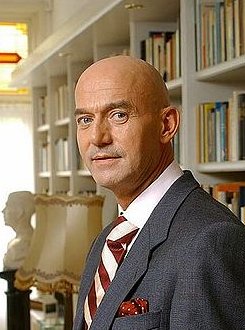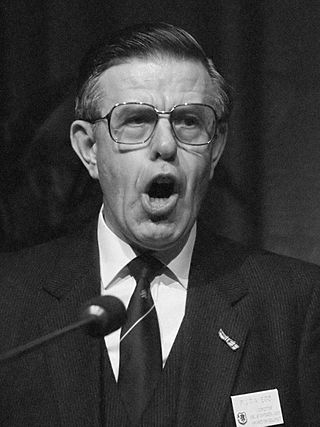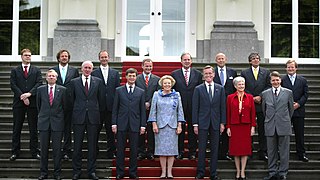
Wilhelmus Simon Petrus Fortuijn, known as Pim Fortuyn, was a Dutch politician, author, civil servant, businessman, sociologist and academic who founded the party Pim Fortuyn List in 2002.

The People's Party for Freedom and Democracy is a conservative-liberal political party in the Netherlands. The VVD, whose forerunner was the Freedom Party, is a party of the centre-right that tries to promote private enterprise and economic liberalism.
The Pim Fortuyn List was a right-wing populist political party in the Netherlands named after its eponymous founder Pim Fortuyn, a former university professor and political columnist. The party was considered nationalist as well as adhering to its own distinct ideology of Fortuynism according to some commentators.
Liberalism in the Netherlands started as an anti-monarchical effort spearheaded by the Dutch statesman Thorbecke, who almost single-handedly wrote the 1848 Constitution of the Netherlands that turned the country into a constitutional monarchy.

The Socialist Alternative Politics is a Trotskyist political group in the Netherlands without parliamentary representation.

Hilbrand Pier Anne Nawijn is a Dutch lawyer and politician of the local political party Lijst Hilbrand Nawijn (LHN) in Zoetermeer.
Mathieu "Mat" Herben is a Dutch journalist, civil servant and retired politician of the dissolved Pim Fortuyn List (LPF) party and served as leader of the LPF 2003 to 2006.
Hartog Hank Richard "Harry" Wijnschenk is a former Dutch politician. From 2002 to 2003 he was an MP for the Pim Fortuyn List (LPF), and later for the Wijnschenk Group. He briefly served as leader of the LPF in 2002.
The Stichting Oud Politieke Delinquenten was a Dutch right-wing organization founded by and for formerly jailed and convicted war criminals, who had collaborated with the German occupiers during World War II. The SOPD was the first and the largest of the collaborationist organizations in the country, "numbering perhaps a hundred former internees."
Jan Hartman (1887–1969) was a Dutch fascist and collaborator during World War II. After the war, he was active in far-right politics, and was one of the two founders of the Stichting Oud Politieke Delinquenten, a right-wing organization founded by and for formerly jailed and convicted war criminals and collaborators.
VoorNederland was a Dutch political party. It was previously active in the House of Representatives of the Netherlands as the Group Bontes/Van Klaveren, a parliamentary group founded in April 2014. The parliamentary group was succeeded by a political party in May 2014. After failing to garner win a single seat in the 2017 general election, the party disbanded.

The Weerbaarheidsafdeling was the paramilitary arm of the National Socialist Movement in the Netherlands (NSB), the fascist political party that collaborated with the German occupiers of the Netherlands during World War II. The organization, roughly equivalent to the German SA, was founded in 1932 by Anton Mussert, co-founder of the NSB in 1931 and its leader until the end of the war. Members wore and marched in black uniforms and were thus called "blackshirts". In 1933 the Dutch government banned the wearing of uniforms, and the WA was disbanded in 1935 in order to forestall the Dutch government's banning it. In 1940, after the German invasion, the WA became openly active again, and more ruthless than before. They specialized in violent attacks, particularly on the Dutch Jewish population.

Prosper Joannes Gerardus Antonius Ego was the founder of the Oud-Strijders Legioen.

Amma Asentewaa Asante is a Dutch politician. She was a member of the municipal council of Amsterdam from 1998 to 2006 and a member of the House of Representatives of the Netherlands for the Labour Party from 2016 to 2017.

Anet Bleich is a Dutch journalist, political commentator, author, columnist and writer.

Bertha "Betsy" Bakker-Nort was a Dutch lawyer and politician who served as a member of the House of Representatives for the Free-thinking Democratic League (VDB) from 1922 to 1942.

Soekaesih was a Communist Party of Indonesia activist known for being one of only a handful of female political prisoners exiled by the Netherlands government to Boven-Digoel concentration camp. After being released she traveled to the Netherlands in the late 1930s and campaigned for the camp to be shut down.
Willem van der Velden was a Dutch politician who served as a member of the House of Representatives from 2002 to 2003.
Anti-fascist research group Kafka, commonly abbreviated to Kafka, is a Dutch anti-fascist and far-left research group, founded by Hans van Drunen. Its name was said to be an acronym for Kollektief Anti-Fascistisch/-Kapitalistisch Archief before 1994, but the research group has since indicated that they had named themselves after the writer Franz Kafka.

After the Dutch general election of 15 May 2002, a cabinet formation took place in Netherlands. This resulted in the First Balkenende cabinet on 22 July 2002. The coalition was formed by Christian Democratic Appeal (CDA), People's Party for Freedom and Democracy (VVD) and the Pim Fortuyn List (LPF).












